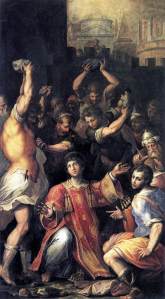“Don’t make me come down there!”
When I was a child, if play got a bit, ‘out of hand’ and turned into arguments – and noisy arguments at that – in the basement of our house, one of the most serious means to quiet us down would be to hear my father’s or mother’s voice calling down from the upper floor, ‘don’t make me come down there!’
Similarly in high school, (I went to a Catholic boy’s school) if we were making noise in our seats, causing distractions during an assembly – when we knew we were supposed to be quiet or paying attention– all it would take to restore silence and attentiveness immediately would be for the principal to stand up, point down to the offending parties and say, ‘don’t make me come down there!’
The distance of time helps to form a better understanding of the experiences in our lives that have made us who were are today. When I reflect through the hindsight of being a parent with active children, or any times I have been in a classroom setting also with active kids, it is easy to understand how, sometimes, our frustrations can give way to words that sound more like threats. “Don’t make me come down there,” can give rise to the question, ‘what will happen if you do come down here?’
This response, in frustration, usually comes from the belief that children should ‘know better’ or are at least on the path to ‘knowing better’ when it comes to living with, interacting with, and cooperating with each other. That arguing, bickering and fighting are not only the result of selfishness or self-interest; but arguing, bickering and fighting are quite often counterproductive. In a family setting, in a fight, nobody wins really; there are usually hurt feelings, resentment and distancing; and it doesn’t just happen in families – it happens in schools, workplaces, and even in church parish communities.
Perhaps approached a different way, the words, ‘don’t make me come down there’ can take on a less threatening tone if we reflect on them through God’s lens. From the beginning of salvation history, God invited His people to live in harmony with each other and with Him; the purpose of His interaction through the Law with His chosen people was to help guide them into together into right relationship with Him.
One of the ways He did this was to pass on rules for living, summarized in the Ten Commandments – these were a means for living out a relationship of harmony and love with God and with each other. (The Commandments are separated into categories really that deal specifically with how we respond to God, and how we live with each other)
These were never meant as threats – they were meant as boundaries to keep us in right relationship – in a relationship of love, to prevent harm.
And God is very serious about having us live in that relationship of love: they are called Commandments – not ‘suggestions’.
But of course, throughout history, time and again, God’s children proved we were not able to live within the framework of those Commandments; our tendency towards self-centeredness and self-destruction proved we weren’t capable on our own of getting along with each other, or with God.
In response to our actions, God ‘came down here’; but it was not in a threatening or angry way – it was in the most loving and self-emptying way of all. He came down here in the person of Jesus, living among us, as one of us, to give an example and to lead us in living as we should, in harmony and love with each other.
But He was serious in what He taught, and in the words He used. In our Gospel passage today from St. John, Jesus uses the word, “commandment’. First off, that means He is illustrating His authority, as God, in giving a New Commandment (like the other Ten) – to love one another as He loves us.
Second, the choice of the word ‘commandment’ means this is not an option or a suggestion; it means ‘commandment’! It is His instruction on how we return to that relationship in harmony with God and with each other.
His example was an example for all of us of total self-emptying. Were there people He argued with? Yes, but it was out of love to instruct them in the Truth. Were there people that didn’t get along with Jesus? Obviously, as some rejected everything about Him to the point of handing Him over to death.
God knows all of our faults, weaknesses and failings. He knows we aren’t going to consider every person, even in our parish, our favorite people or even someone we want to spend all of our time engaged with; but what is commanded is that we get along. We are commanded not to gossip, not to fight amongst ourselves, not to seek gain at the expense of others, not to place our own self-interests above God. We are commanded to hold each other up in prayer; to support each other as a community of faith, and to empty ourselves for the sake of our brothers and sisters who most need our assistance and support.
That, Jesus said, is how others will know (and how we will know) that we are His disciples; by our love for each other and our love for God.
And for that, we can be eternally grateful, as God’s children; that God’s love for us, made Him ‘come down here.’
Praised be Jesus Christ, now and forever!



